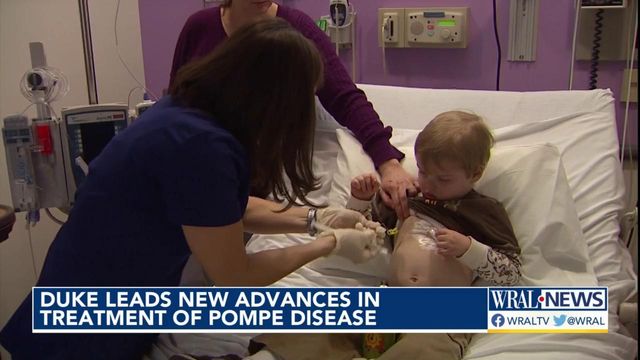Duke Health creates new therapy to save babies while in utero
A new therapy offers hope for families facing a rare and typically fatal condition called Pompe Disease. Experts at Duke Health pioneered the initial research and treatments for young children.
Posted — UpdatedExperts at Duke Health pioneered the initial research and treatments for young children who are diagnosed with a rare and typically fatal condition called Pompe Disease.
Their research has led to the development of a multinational team including Duke University, the University of California at San Francisco and maternal fetal medicine specialists at the Ottawa Hospital in Canada. They researched the use of enzyme replacement therapy in fetuses that had been identified with infantile-onset Pompe Disease.
"It mostly causes muscle damage and muscle weakness," said Duke pediatrician Dr. Jennifer Cohen, who is part of Dr. Kishnani's team.
Their team developed an enzyme replacement therapy as well as a way to keep the body's immune system from resisting the treatment. Cohen said the regimen and protocol they developed at Duke is now used all over the world.
Dr. Kishnani also pushed for universal newborn screening so that treatment could begin within the first few weeks of life, and then even earlier in the womb.
"Helping the enzyme get to the fetus before that damage can occur is really crucial," Cohen said.
The New England Journal of Medicine published a report saying that the multinational team was the first in the world to provide enzyme replacement therapy in utero.
This new therapy was first tested on a family who had already lost two children to Pompe Disease. Cohen said they were pioneers for the advancement of treating this disease.
"[They're] a brave family for being the first to try this in-utero therapy," Cohen said.
Many of the children who participated in the earlier trials of the Duke program did not survive the disease, but Cohen said their contribution was crucial to the progress being made today.
"I think without all of these families, none of this research, of course, would be possible," said Cohen. "So we are so grateful to them."
Related Topics
• Credits
Copyright 2024 by Capitol Broadcasting Company. All rights reserved. This material may not be published, broadcast, rewritten or redistributed.






